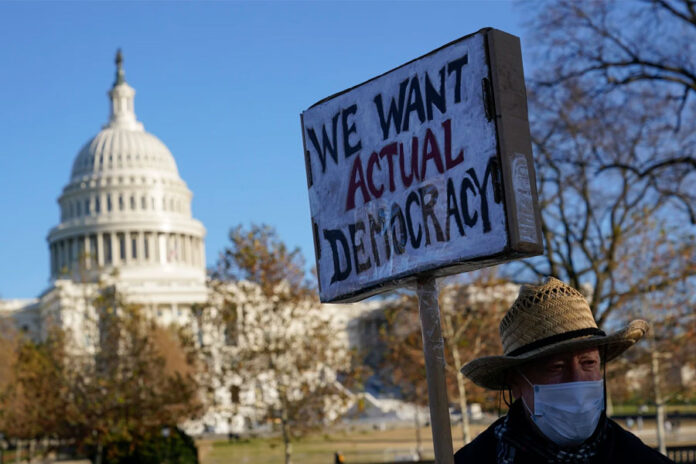
Only about 1 in 10 U.S. adults give high ratings to the way democracy is working in the United States or how well it represents the interests of most Americans, according to a new poll from The Associated Press-NORC Center for Public Affairs Research.
Majorities of adults say U.S. laws and policies do a poor job of representing what most Americans want on issues ranging from the economy and government spending to gun policy, immigration and abortion. The poll shows 53% say Congress is doing a bad job of upholding democratic values, compared with just 16% who say it’s doing a good job.
The findings illustrate widespread political alienation as a polarized country limps out of the pandemic and into a recovery haunted by inflation and fears of a recession. In interviews, respondents worried less about the machinery of democracy — voting laws and the tabulation of ballots — and more about the outputs.
Overall, about half the country — 49% — say democracy is not working well in the United States, compared with 10% who say it’s working very or extremely well and 40% only somewhat well. About half also say each of the political parties is doing a bad job of upholding democracy, including 47% who say that about Democrats and even more — 56% — about Republicans.
“I don’t think either of them is doing a good job just because of the state of the economy — inflation is killing us,” said Michael Brown, a 45-year-old worker’s compensation adjuster and father of two in Bristol, Connecticut. “Right now I’m making as much as I ever have, and I’m struggling as much as I ever have.”

A self-described moderate Republican, Brown has seen the United States falling short of its democratic promise ever since learning in high school that the Electoral College allows someone to become president while not winning the majority of national votes. But he’s especially disappointed with Congress now, seeing its obsessions as not reflective of the people’s will.
“They’re fighting over something, and it has nothing to do with the economy,” Brown said, singling out the GOP-controlled House’s investigation of President Joe Biden’s son.
“Hunter Biden — what does that have to do with us?” he asked.
The poll shows 53% of Americans say views of “people like you” are not represented well by the government, with 35% saying they’re represented somewhat well and 12% very or extremely well. About 6 in 10 Republicans and independents feel like the government is not representing people like them well, compared with about 4 in 10 Democrats.
Karalyn Kiessling, a researcher at the University of Michigan who participated in the poll, sees troubling signs all around her. A Democrat, she recently moved to a conservative area outside the liberal campus hub of Ann Arbor, and worried that conspiracy theorists who believe former President Donald Trump’s lies that he won the 2020 election would show up as poll watchers. Her Republican family members no longer identify with the party and are limiting their political engagement.
Kiessling researches the intersection of public health and politics and sees many other ways to participate in a democracy in addition to voting — from being active in a political party to speaking at a local government meeting. But she fears increased partisan nastiness is scaring people away from these crucial outlets.
“I think people are less willing to get involved because it’s become more contentious,” Kiessling, 29, said.
That leads to alienation at the national level, she said — something she certainly feels when she sees what comes out of Washington. “When you have a base that’s a minority of what general Americans think, but they’re the loudest voices in the room, that’s who politicians listen to,” Kiessling said.
Polarization has transformed some states into single-party dominions, further alienating people like Mark Short, a Republican who lives in Dana Point, California.
“In California, I kind of feel that I throw my vote away every time, and this is just what you get,” said Short, 63, a retired businessman.
The poll shows that the vast majority of Americans — 71% — think what most Americans want should be highly important when laws and policies are made, but only 48% think that’s actually true in practice.

And views are even more negative when it comes to specific issues: About two-thirds of adults say policies on immigration, government spending, abortion policy and gun policy are not representative of most Americans’ views, and nearly that many say the same about the economy as well as gender identity and LGBTQ+ issues. More than half also say policies poorly reflect what Americans want on health care and the environment.
Joseph Derito, an 81-year-old retired baker in Elmyra, New York, sees immigration policy as not representing the views of most Americans. “The government today is all for the people who have nothing — a lot of them are capable of working but get help,” said Derito, a white political independent who leans Republican and voted for Trump. “They just want to give these people everything.”
Sandra Wyatt, a 68-year-old retired data collection worker and Democrat in Cincinnati, blames Trump for what she sees as an erosion in democracy. “When he got in there, it was like, man, you’re trying to take us back to the day, before all the rights and privileges everybody fought for,” said Wyatt, who is Black, adding that she’s voted previously for Republicans as well.
She sees those bad dynamics as lingering after Trump’s presidency. “We always knew there was racism but now they’re emboldened enough to go around and shoot people because of the color of their skin,” Wyatt said.
Stanley Hobbs, a retired autoworker in Detroit and a Democrat, blames “a few Republicans” for what he sees as democracy’s erosion in the U.S. He sees those GOP politicians as beholden to a cabal of big businesses and points to issues like abortion as examples of how the laws no longer represent the views of the majority of Americans.
He’s trying to stay optimistic.
“It seems like this always happens in the U.S. and we always prevail,” Hobbs said, recalling how American politicians sympathetic to Nazi Germany gained prominence before World War II. “I just hope we prevail this time.”























